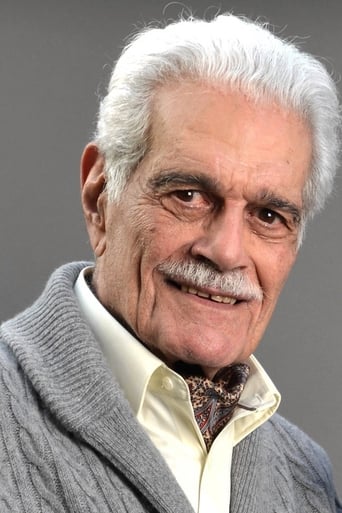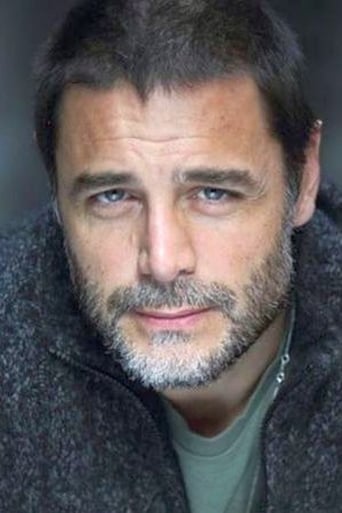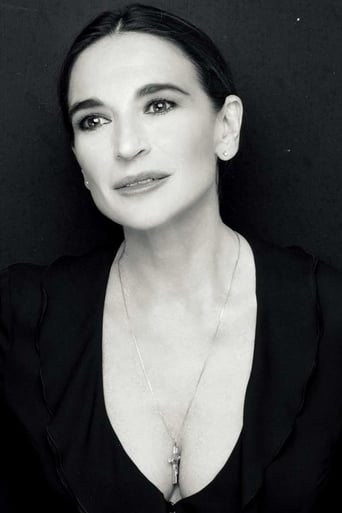Lancoor
A very feeble attempt at affirmatie action
Bessie Smyth
Great story, amazing characters, superb action, enthralling cinematography. Yes, this is something I am glad I spent money on.
Brennan Camacho
Mostly, the movie is committed to the value of a good time.
Philippa
All of these films share one commonality, that being a kind of emotional center that humanizes a cast of monsters.
Kirpianuscus
Omar Shariff does a good job. that is the first verdict after the end of film. a film who propose , in 197 minutes, not a religious lesson but a circle of stories. and who propose a different Saint Peter, more humble, kind and, maybe, wise. it is touching and convincing. it is beautiful and credible. and propose an inspired manner to discover the Christianity in its essence. that is the rare gift who impose this film as a trip in the manner to assume the faith. Saint Peter of Omar Shariff is vulnerable and looking the right answer to his brothers and sisters in faith. he becomes a guide for community as result of his fear, doubts, need to be the disciple of the Lord who is not only the model but the only real solution to assume the challenges.and that does Peter not the first Pope, the saint or the first apostle but a kind of country priest from the novel of Bernanos. his success is different by the character of the French writer. the purpose is the same. and that detail does the film beautiful. the dialog, the patience, the atmosphere, not real different by the atmosphere of many Christian films but more subtle and warm for send the message in right manner. a film about the build of faith. and the birth of Church.
pharoa2
good things about this movie...Peter's acting is really amazing and believable (most of the time) and scenery, camera action and music are better than mediocre...bad things: ACTING....OMG it is terrible!!! I have never seen a movie with that horrible acting...from Paul, Silvia, Fulvia, Jesus (who looks like a Dracula)...all the extras sucked ...along with the fakest crying and screaming I have ever seen!! Audio-Video Synch....WOW!!! soooo annoying enough said... Acting Voices...some of the actors' voices don't match the way the look, react or behave...or even the way they express their emotions... Direction of movie....it's like the Acts that you never read! really who wrote this script!!! and a love story that I could never find in any documented Christian book or history!!!BOTTOM LINE: ITALIANS SHOULD NOT DIRECT English MOVIES!!!!
Michael Nielsen (subfour1600)
I'm sorry to burst any religious bubbles here, but it was one of the most disappointing portrayals of this amazing time of Church history I have ever seen. I was very excited when I saw this film in the video store and with Easter coming up. I thought it would be a very appropriate for the time of year. I also was excited to see Omar Sharif as St. Peter and I thought this movie was going to be pretty good. Omar Sharif didn't disappoint, however, just about everything else did. With one exception: The cinematography, which was quite beautiful at times.However the acting was terrible. I was trying to figure out why their voices were out of sync, and I thought, "Oh well it's an Italian film." But Sharif's mouth as did other actor's seemed to be speaking English. There are few who looked like they were speaking another language (assume Italian) hence the dub, but the majority was terribly out of sync. It's listed as an English speaking film, so I don't know what happened. To be honest, I think "The Good, The Bad, and The Ugly" was in better sync.The direction was something to be desired. It almost seemed as if the director Giulio Base did one take on everything and said, "That'll work, let's fix it in post if needed". When it seemed that Base was trying to create an "individual moment", it only worked because of Sharif. However, with the dubbing/sync issues some of it was absolutely laughable. Especially whenever the character Mark (Possibly the Gospel Author) would cry (Which seemed to be more than my 3 year old daughter). It just wasn't believable.The story itself seemed relevant and historically plausible until we get to Rome and we're introduced to a fictional, forbidden, love story and to a fictional slave family, whose father is a masked gladiator. This is when the wheels fell off completely for me. The story moves into the realm of nonsense and it's unclear what is fact and what is fiction. In Rome, all of a sudden these two fictionalized B & C story lines are introduced after almost 90 minutes into the film. I didn't care about these people, I cared about Peter and Paul and wanted to know what happened to them, the other stories just seemed thrown in there by a studio or executive producers thinking we needed a love story. It was a distraction rather than an enhancement.If one of the underlying objectives of this film is to show Rome and St. Peter as the beginning of the Papacy and the establishment of the Holy See then this fictional tale of this family and the two forbidden lovers just deflates the authority of this story. In addition, the gladiator fight scenes looked like two 10 year-olds playing Power Rangers on their front lawn. The "out of the blue" conversion at the end of the Roman official who hated Peter and resisted Christianity the whole time is never addressed, but he's given the final words as St. Peter hangs from the cross to the effect, "All of Rome has changed because of you Peter". Why on earth would you allow that, in addition to people just sitting around as if Peter is being crucified in their living room? If this happened like this I don't know, but due to above mentioned fictional aspects of the film I doubt the scenes accuracy. The only aspect that I do know was true was Peter being crucified upside down and the words he used, which were beautiful "I am not worthy to die in same manner as our Lord".I don't even want to get started on the editing, which had no rhythm and pulled us out of scenes like smelling salt did to Apollo Creed in Rocky I & II. Editor Alessandro Lucidi as is Base, is no strangers to this genre. However if the director doesn't give you anything to cut out from to cut to then you're stuck with what you have I guess.The story was too spoon fed for me, almost written for a 12 year old audience. I would recommend the film for Catholic school students grades 4th – 8th. I don't think a lot of Evangelicals or Protestants would approve of the story due to its portrayal (however true it may be) of the establishment of Rome as the "Heart of Christ Church" as Sharif's St. Peter put it. However, maybe somehow the Holy Spirit can overcome the obstacles of this film and deliver the message it was trying to make to those mentioned above. I just think the filmmakers missed a great opportunity to deliver a powerful and true story. Peter and Paul keep talking about "The Truth" but in the context of this film "The Truth" comes into question. I have feeling the producers might have come into the edit bay after the director's cut and really messed this film up, because I can't buy that Base would make the decisions he made.
Marcin Kukuczka
"One heart, one soul" These words that appear many times in the magnificent latest movie by Giulio Base are not just the words that relate to early Christian attitude but they are clearly reflected throughout the film made with honest effort and great faith both from the crew and the cast. I have seen many religious historical epics. Nevertheless, I have to admit that seldom have I seen such a purely faithful movie where almost each moment is an experience. Let me discuss some of the aspects of the film that make it a brilliant piece of film art.CONTENT: Giulio Base's film can be divided into two parts concerning the content. The first part discusses purely historical events from the New Testament, beginning with the death and resurrection of Christ and going on to Apostles' meetings, conversions to the new faith, quarrels who actually has the right to be baptized, persecutions from Jews, the miraculous story of Saul/Paul, and ending with Peter's journey to the heart of the empire, Rome. The events showed in the second part take place primarily in Rome, with some fictitious characters that are contextualized in the whole life stories of Peter and Paul. We see two families whose lives are connected by love and faith. Claudius Maximus (Ettore Basi), the son of a wealthy Roman, Persius (Ennio Caltorti), falls in love with a Christian girl Silvia (Bianca Guaccero). He does not see any benefit in the new faith at first but slowly starts to believe in the Son of God. Will this help him retain good relations with his family? Moreover, a mystery from his family's past is revealed at the moment of the death of Claudius' Grandma... In the other family, David (Flavio Insinna), the masked gladiator called Trachus, fights on arena as a gladiator. However, he hides this truth from his Christian wife, Anna (Claudia Koll). Yet, his life in two worlds cannot last forever and he once has to stand before the choice... earthly or spiritual freedom?... Among these vivid stories, the director shows Peter-Paul relations. Sometimes, they are exaggerated because these two have not met so many times and probably died on the same day not having met in prison before. Yet, it must be treated rather in the symbolic way. The primary fact about them is that they were the two greatest Apostles of Christ's Church. In the end, we see the persecutions of Christians and Peter who leaves Rome and meets the Lord on his way who is going to be crucified again...BEAUTIFUL MOMENTS: The film is filled with a number of magnificent scenes that I deeply experienced to tears. If you decide to see the movie, pay attention to little aspects that are perhaps not so clear at once but noticed after a longer inspection. These aspects, which I noticed at the second viewing, are the real pearls of the film. These are, among many others, the visit at Cornelius' in Caesarea, the Eucharist in prison, the symbolic moment of joy at Christ's resurrection, the conversation with a prostitute ("Is there really such a God who will forgive?") or Paul's miraculous way for Damascus. Except for the above, I will never forget Sylvia-Claudius conversation in his beautiful gardens. "What do you lack? What more is there that can make you happy? asks Claudius. Immediately, the question is answered by a voice coming from the streets of Rome "Jesus is true happiness!" I also loved the moment of retrospection in time. Peter decides to put up his mission in Rome but unintentionally comes back in memory to the words of Christ: "You are the rock and on this rock I shall build my Church". The end is also unbelievably beautiful and touching, which refers to one historical and spiritual fact: Rome has changed forever and the whole world will never be the same since the Redeemer makes all things new...CAST: Among the films about Peter's elderly years in Rome, Omar Sharif portrays the fishermen of people in the most memorable way I have seen so far: better than Dennis Quiley in A.D (1985), more authentic than Franciszek Pieczka in QUO VADIS? (2000), even more appealing than Finlay Currie in Hollywood's monumental production QUO VADIS? (1951) by Mervyn LeRoy. He is great with that blink in his eyes that probably real saint Peter had and at showing love for all men that real saint Peter learned from his Lord. Omar Sharif is magnificent and even if you are not religious, you will love this film thanks to his performance. Other cast are not that famous but they give fine performances, too. I particularly liked Bianca Guaccero in the role of gentle young girl Silvia, so in love with Claudius. Among others, these are Italian cast who very well fit to the roles of the Romans.LOCATIONS: There is one more reason why I like the movie. The landscapes that the film shows are very much like the ones in Palestine. After my journey to the Holy Land, I deeply feel this sense of authenticity. Therefore, some biblical films seemed so unnatural because they were made in wrong locations. Giulio Base's film does a great job throughout, including the Sea of Galilee, Capernaum, the reconstruction of the Jerusalem and the Rome of the 1st century. So far, such an authentic film concerning locations was Franco Zeffirelli's production with Robert Powell.I would recommend everyone to see this film, no matter if old or young, Christian, Jew or Muslim, believer or atheist. It is a splendid film which is not a "Christian propaganda" as some cynical people unjustly call such films. It is the film which primarily focuses on the dignity, freedom and love of every human being. 10/10 Excellent movie that I dream to see for the third time!





